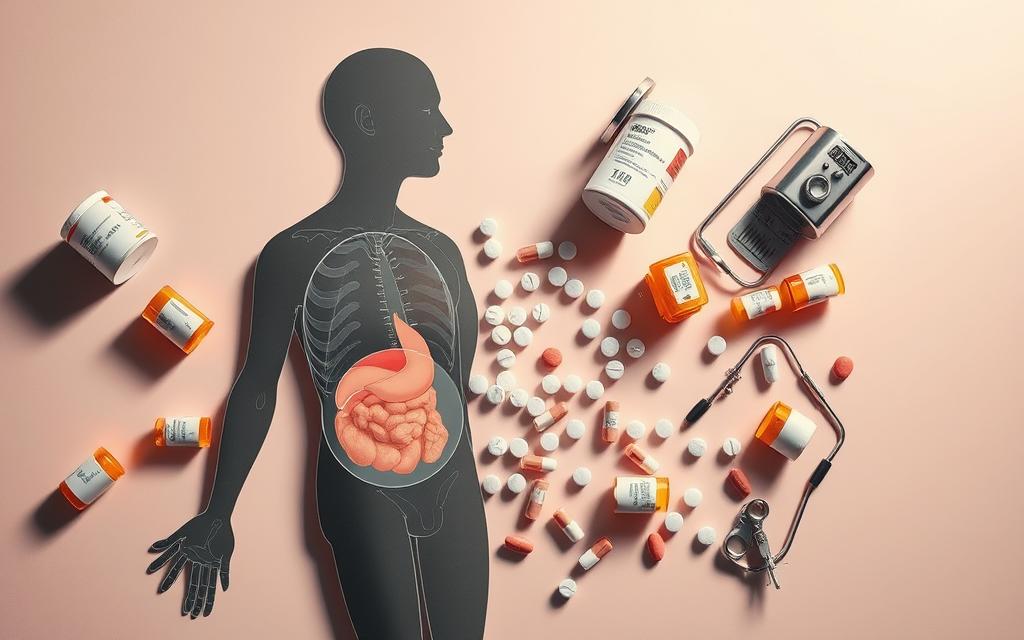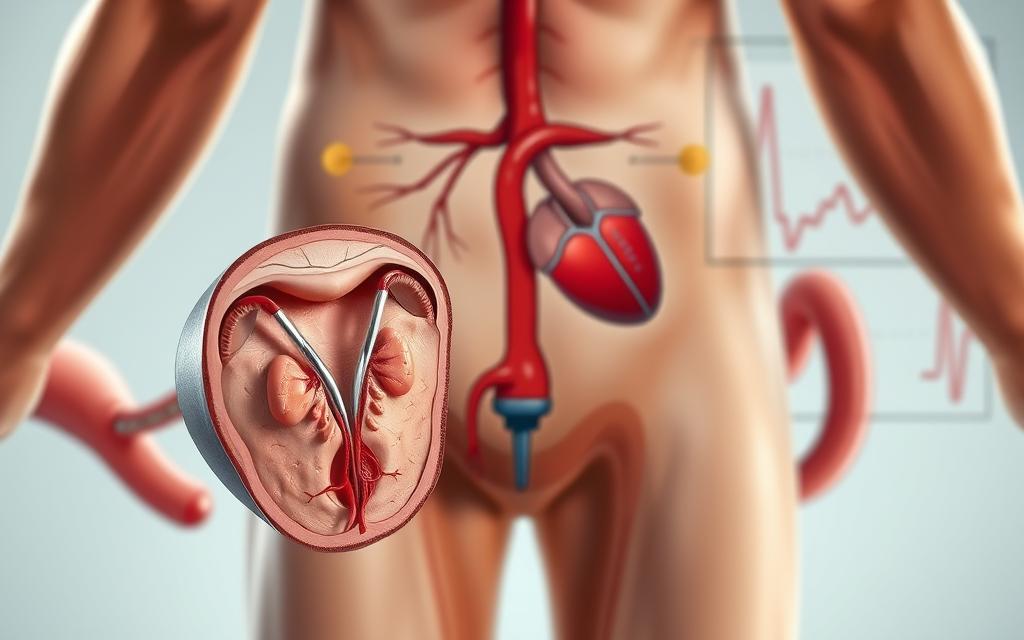Blood Pressure Medications That Cause Erectile Dysfunction: What You Need to Know
Hypertension, or high blood pressure, is a widespread condition that affects millions of people worldwide. Managing it often involves taking medication, but some treatments can have unintended effects on sexual health.
One of the concerning side effects of certain blood pressure medications is erectile dysfunction. This condition can significantly impact a person’s quality of life, making it essential to understand the relationship between these medications and their potential effects.
For individuals dealing with hypertension, it’s crucial to balance the need for effective treatment with the potential risks to sexual health. By exploring the connection between blood pressure medication and erectile dysfunction, we can better navigate the available options and make informed decisions.
Understanding the Connection Between Blood Pressure Medication and Erectile Dysfunction
Blood pressure medication, while essential for managing hypertension, can have unintended effects on sexual health. The connection between blood pressure medication and erectile dysfunction (ED) is a concern for many individuals managing hypertension.
Erectile dysfunction is a condition characterized by the inability to achieve or maintain an erection sufficient for satisfactory sexual performance. The prevalence of ED among men taking blood pressure medication is a significant concern, as it can affect their quality of life and overall well-being.
The Prevalence of ED Among Blood Pressure Medication Users
Studies have shown that the prevalence of erectile dysfunction is higher among men taking certain blood pressure medications compared to the general population. For instance, a study published in the Journal of Clinical Hypertension found that nearly 40% of men taking beta-blockers experienced ED, compared to about 10% in the general male population.
| Blood Pressure Medication Type | Prevalence of ED |
|---|---|
| Beta Blockers | Nearly 40% |
| Diuretics | Around 25% |
| ACE Inhibitors | Approximately 15% |
For more detailed information on how blood pressure and erectile dysfunction are related, you can visit Colorado Urologists, a resource that provides insights into managing both conditions.
Why Treating Both Hypertension and Sexual Health Matters
Treating hypertension is crucial for preventing cardiovascular diseases, but it’s equally important to address sexual health concerns. Ignoring ED can lead to decreased quality of life, affecting not just the individual but also their relationships. Therefore, healthcare providers should consider both conditions when managing patient care.
It’s essential for patients to discuss their sexual health openly with their healthcare providers to find a balance between managing hypertension and mitigating the sexual side effects of blood pressure medication.
How Blood Pressure Medications Affect Sexual Function
Understanding how blood pressure medications impact sexual health is essential for overall well-being. Blood pressure medications are a crucial part of managing hypertension, but they can have unintended effects on sexual function.
The Physiological Mechanisms Behind Medication-Induced ED
Blood pressure medications can affect erectile function through various physiological mechanisms. Two key factors are blood flow reduction and hormonal influences.
Blood Flow Reduction and Erectile Function
Erectile dysfunction (ED) often involves issues with blood flow. Certain blood pressure medications, particularly those that lower blood pressure significantly, can reduce blood flow to the penis, making it difficult to achieve or maintain an erection. Medications like Cialis are often prescribed to treat ED, but their effectiveness can be influenced by the type of blood pressure medication being used.
Hormonal Influences
Hormones play a critical role in sexual health. Some blood pressure medications can affect hormone levels, including testosterone, which is essential for erectile function. For instance, certain diuretics can lead to decreased testosterone levels, potentially contributing to ED.

Risk Factors That Increase Your Chances of Experiencing ED
Several risk factors can increase the likelihood of experiencing erectile dysfunction while taking blood pressure medications. These include age, pre-existing health conditions, and considerations regarding medication dosage.
Age and Pre-existing Conditions
Older adults are more likely to experience ED due to the natural aging process and the higher likelihood of having pre-existing health conditions such as diabetes or cardiovascular disease. These conditions can further complicate the management of blood pressure and erectile function.
Medication Dosage Considerations
The dosage of blood pressure medication can also impact the risk of developing ED. Higher doses are more likely to cause sexual side effects. Healthcare providers often aim to find the lowest effective dose to minimize such effects.
| Risk Factor | Description | Impact on ED |
|---|---|---|
| Age | Natural aging process | Increased risk |
| Pre-existing Conditions | Diabetes, cardiovascular disease | Higher likelihood |
| Medication Dosage | Higher doses | More likely to cause ED |
Types of Blood Pressure Medication That Causes Erectile Dysfunction
Understanding the different types of blood pressure medications that can cause erectile dysfunction is essential for both patients and healthcare providers. Various classes of antihypertensive drugs have been associated with sexual side effects, and being aware of these can help in making informed decisions about treatment.
Beta Blockers and Their Impact on Sexual Function
Beta blockers are a commonly prescribed class of antihypertensive medications that can affect sexual function. They work by reducing the heart rate and the heart’s workload, but this mechanism can also lead to erectile dysfunction in some men.
Propranolol, Metoprolol, and Atenolol
Specific beta blockers such as propranolol, metoprolol, and atenolol have been studied for their potential to cause erectile dysfunction. These medications are widely used to treat hypertension and other heart-related conditions.
Severity and Frequency of ED Side Effects
The severity and frequency of erectile dysfunction as a side effect can vary among different beta blockers. Some studies suggest that older beta blockers are more likely to cause sexual side effects compared to newer ones.
Diuretics and Sexual Side Effects
Diuretics, commonly known as “water pills,” are another class of antihypertensive medications that can contribute to erectile dysfunction. They help reduce blood pressure by eliminating excess fluid from the body.
Thiazide Diuretics: Hydrochlorothiazide and Chlorthalidone
Thiazide diuretics, including hydrochlorothiazide and chlorthalidone, are frequently prescribed diuretics. Research has indicated that these medications can lead to erectile dysfunction, potentially due to their effect on hormonal balance.
How Water Pills Affect Hormonal Balance
The use of diuretics can lead to changes in hormonal balance, which may contribute to erectile dysfunction. This is because certain diuretics can affect potassium levels and potentially influence other hormonal pathways.
ACE Inhibitors and Their Sexual Side Effect Profile
ACE inhibitors are a class of antihypertensive drugs that work by relaxing blood vessels, making it easier for the heart to pump blood. Generally, ACE inhibitors are considered to have a more favorable sexual side effect profile compared to some other antihypertensive medications.
Other Antihypertensives That May Affect Sexual Function
Apart from beta blockers, diuretics, and ACE inhibitors, other antihypertensive medications can also impact sexual function. These include certain calcium channel blockers and alpha blockers, although their effects on erectile function can vary.
Blood Pressure Medications Less Likely to Cause ED
Hypertension treatment has come a long way, with some medications offering a reduced risk of erectile dysfunction. For individuals managing high blood pressure, the goal is to find a treatment that effectively controls hypertension without compromising sexual health.
Angiotensin II Receptor Blockers (ARBs): A Better Alternative?
Angiotensin II Receptor Blockers, or ARBs, are a class of antihypertensive drugs that have shown promise in minimizing the risk of erectile dysfunction. Unlike some other blood pressure medications, ARBs work by blocking the action of angiotensin II, a potent vasoconstrictor, which is part of the body’s renin-angiotensin-aldosterone system (RAAS). By relaxing blood vessels, ARBs not only lower blood pressure but may also have a positive effect on sexual function.
Key benefits of ARBs include:
- Effective blood pressure control
- Potential protective effects on sexual function
- Favorable side effect profile compared to some other antihypertensives
Calcium Channel Blockers and Sexual Function
Calcium Channel Blockers (CCBs) are another class of medications used to treat hypertension. They work by inhibiting the influx of calcium ions into vascular smooth muscle cells and cardiac muscles, thereby reducing vascular resistance and arterial pressure. Research suggests that CCBs may have a neutral or even positive effect on sexual function, making them a viable option for patients concerned about ED.
Alpha Blockers: Potential Benefits for Both Conditions
Alpha blockers are primarily used to treat benign prostatic hyperplasia (BPH) but are also effective in managing hypertension. They work by relaxing the muscles in the prostate and bladder neck, making it easier to urinate, and also cause blood vessels to relax, lowering blood pressure. Some studies suggest that alpha blockers may have a beneficial effect on erectile function, although more research is needed to confirm this.
Newer Medications With Improved Side Effect Profiles
The landscape of hypertension treatment is continually evolving, with newer medications being developed to offer better efficacy and fewer side effects. Some of these newer antihypertensive medications have shown promise in reducing the risk of erectile dysfunction. For example, certain drugs that target the RAAS system, like direct renin inhibitors, may offer advantages in terms of sexual side effects.
| Medication Class | Effect on Blood Pressure | Effect on Sexual Function |
|---|---|---|
| ARBs | Effective in lowering BP | Potential protective effects |
| Calcium Channel Blockers | Effective in lowering BP | Neutral or positive effect |
| Alpha Blockers | Effective in lowering BP | Potential benefits for ED |
| Newer Antihypertensives | Varies by medication | Potential for reduced ED risk |
Talking to Your Doctor About ED and Blood Pressure Medication
When blood pressure medication affects your sexual health, discussing the issue with your doctor can help you find a solution. Erectile dysfunction (ED) is a common side effect of certain blood pressure medications, and addressing it with your healthcare provider is crucial for managing both your hypertension and sexual health.
When to Seek Medical Advice About Sexual Side Effects
If you’re experiencing symptoms of ED, such as difficulty achieving or maintaining an erection, it’s essential to consult your doctor. Don’t hesitate to discuss your concerns; your healthcare provider can help you determine the cause and find an appropriate solution.
Some signs that you should seek medical advice include:
- Persistent difficulty with erections
- Reduced libido
- Other sexual health concerns
How to Discuss Sexual Health Concerns With Your Healthcare Provider
Discussing sexual health concerns can be challenging, but being open with your doctor is vital. Here are some tips to help you have this conversation:
- Be honest about your symptoms and how they’re affecting your life.
- Ask questions about your medication and potential alternatives.
- Discuss any lifestyle changes that might help alleviate your symptoms.
The Dangers of Discontinuing Blood Pressure Medication Without Consultation
It’s crucial not to stop taking your blood pressure medication without consulting your doctor, even if you’re experiencing sexual side effects. Stopping your medication abruptly can lead to serious health risks, including uncontrolled high blood pressure, heart attack, or stroke.
| Risks of Stopping Medication | Potential Consequences |
|---|---|
| Uncontrolled high blood pressure | Heart attack, stroke, kidney damage |
| Discontinuing medication abruptly | Rebound hypertension, cardiovascular events |
What Information to Track Before Your Appointment
Before discussing your ED and blood pressure medication with your doctor, it’s helpful to track some information. Keeping a record of your symptoms, medication schedule, and any changes in your condition can provide valuable insights for your healthcare provider.
Consider tracking the following:
- The frequency and severity of your ED symptoms
- Any changes in your blood pressure medication or dosage
- Lifestyle factors that might be influencing your condition, such as diet, exercise, or stress levels
Treatment Options and Management Strategies
Erectile dysfunction caused by blood pressure medication can be effectively managed through a combination of medication adjustments, ED treatments, and lifestyle modifications.
Medication Adjustments: Dosage Changes and Alternative Drugs
In some cases, adjusting the dosage of the current blood pressure medication or switching to a different medication can help alleviate erectile dysfunction symptoms. This decision should be made in consultation with a healthcare provider.
For instance, certain blood pressure medications like Angiotensin II Receptor Blockers (ARBs) are known to have a more favorable side effect profile regarding sexual function. Discussing these options with your doctor can help determine the best course of action.
ED Treatments Compatible With Hypertension Management
Various treatments are available for managing erectile dysfunction, including PDE5 inhibitors like sildenafil (commonly known by the brand name Viagra) and tadalafil. However, it’s crucial to consider their safety when taken with blood pressure medications.
PDE5 Inhibitors: Safety Considerations With Blood Pressure Medications
When taking blood pressure medication, it’s essential to consult with your healthcare provider before starting PDE5 inhibitors. For more information on treatment options when PDE5 inhibitors are not effective, you can visit this resource.
Alternative Treatments for ED
For those who cannot take PDE5 inhibitors or have not seen improvement, alternative treatments such as penile implants or vacuum erection devices may be considered. These options should be discussed with a healthcare provider to determine the most suitable treatment plan.

Lifestyle Modifications That Improve Both Blood Pressure and Sexual Function
Making certain lifestyle changes can have a positive impact on both blood pressure and erectile dysfunction. These modifications include dietary changes, regular exercise, and stress management techniques.
Diet and Exercise Recommendations
Adopting a healthy diet rich in fruits, vegetables, and whole grains, along with regular physical activity, can help manage blood pressure and improve overall cardiovascular health, potentially reducing the severity of erectile dysfunction.
Stress Management Techniques
Stress can exacerbate both hypertension and erectile dysfunction. Techniques such as meditation, yoga, and deep breathing exercises can help manage stress levels.
Psychological Support and Counseling Options
Erectile dysfunction can have a significant psychological impact. Seeking support from a mental health professional or joining a support group can provide emotional support and help individuals cope with the condition.
Conclusion
Effectively managing erectile dysfunction (ED) and hypertension requires a comprehensive approach that addresses both conditions simultaneously. By understanding the connection between blood pressure medication and ED, individuals can work with their healthcare providers to find suitable treatment options.
Blood pressure control is crucial for overall cardiovascular health, and various hypertension treatment options are available. Some medications, such as certain beta blockers and diuretics, may have a higher risk of causing ED, while others like Angiotensin II Receptor Blockers (ARBs) and calcium channel blockers may be more suitable for individuals with sexual health concerns.
Managing ED involves not only adjusting blood pressure medications but also incorporating lifestyle modifications that improve both blood pressure and sexual function. By adopting a healthy lifestyle and exploring available treatment options, individuals can mitigate the risks associated with both conditions and improve their overall quality of life, maintaining good sexual health.
